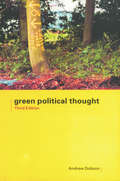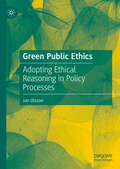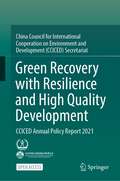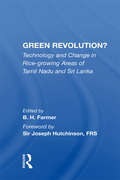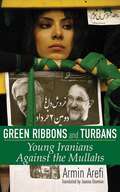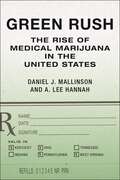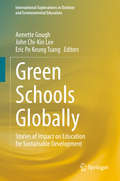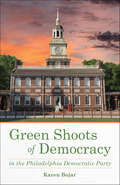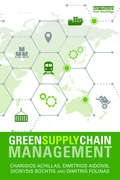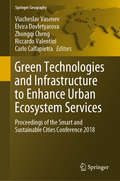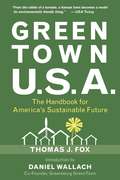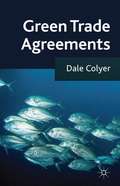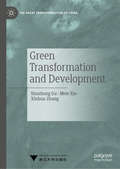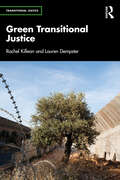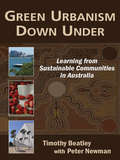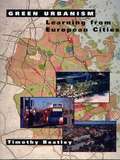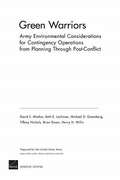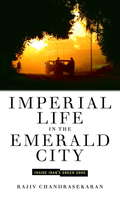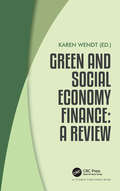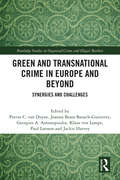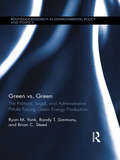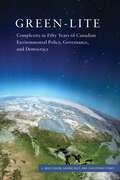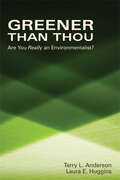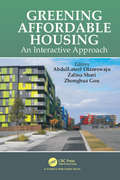- Table View
- List View
Green Political Thought
by Andrew DobsonAndrew Dobson's highly acclaimed introduction to green political thought is now available in a new edition. It has been fully revised and updated to take into account the areas that have grown in importance since the last edition was published.The third edition includes:* a comparison of ecologism with other principal modern ideologies, such as liberalism, conservatism, fascism, socialism, feminism and anarchism* an assessment of the relationship between green thinking and democracy, justice and citizenship* an exploration of 'sustainable development' addressing the fundamental question of 'what to sustain?'* real environmental problems and how green thinking relates to them.
Green Public Ethics: Adopting Ethical Reasoning in Policy Processes
by Jan OlssonThis book argues that ethical reasoning should be adopted into policy processes in order to improve environmental regulations. It considers how public administrators and civil servants play key roles in policy making and implementation, and demonstrates how the inclusion of green public ethics at every stage of the policy process could drastically enhance sustainable development initiatives. Filling an important void in the literature on policymaking and environmental ethics, the book draws from empirical case studies to demonstrate how ‘green’ ethical reasoning can be utilised by practitioners and stakeholders in democratic governments. It will appeal to all those interested in public policy, public administration, philosophy and environmental studies.
Green Recovery with Resilience and High Quality Development: CCICED Annual Policy Report 2021
by CCICEDThis open access book is based on the research outputs of China Council for International Cooperation on Environment and Development (CCICED) in 2021. It covers major topics of Chinese and international attention regarding green development, such as climate, biodiversity, ocean, BRI, urbanization, sustainable production and consumption, technology, finance, value chain, and related topics. It also reviews the progress of China‘s environmental and development policies and the impacts from CCICED. This is a highly informative and carefully presented book, providing insight for policy makers in environmental issues.
Green Revolution?: Technology And Change In Rice-growing Areas Of Tamil Nadu And Sri Lanka (Cambridge Commonwealth Ser.)
by B. H. Farmer Joseph HutchinsonAs will be made clear in the pages that follow, this book is based on a field research project focused on rice-growing and undertaken in parts of North Arcot District in Tamil Nadu (India) and of Hambantota and Mon-eragala Districts, Sri Lanka. We use 'S.E. Sri Lanka' as shorthand for the whole of the latter study area, and 'Hambantota District' for the part of it which falls in that District. Except where the context requires otherwise, the present in our book refers to 1973-4; while 'Randam' and 'Paha-lagama' are fictitious names for real villages. The project was an inter-disciplinary one, involving workers qualified in economics, geography, hydrology, sociology, statistics and the study of the administration of development.
Green Ribbons and Turbans: Young Iranians Against the Mullahs
by Joanna Oseman Armin ArefiDuring the last presidential election in Iran, nonviolent protestors defied the mullahs' power by wearing green ribbons on their wrists. In June of 2009, the inhabitants of Tehran were living underground to escape the government's authority, strangled by interdictions, dreaming of freedom and revolution. Mahmoud Ahmadinejad, president of the Islamic Republic of Iran and desperate to maintain his power, defeated his opponent, Mahmoud Mousavi, by massive electoral fraud. The resulting frustration and anger throughout the country sparked a gigantic wave of opposition. The Green Movement was born.In this timely, politically relevant, and unique account of life in Iran, Arefi takes us to a world removed from the usual cultural and political clichés about Iran and lets us hear the voices of a new generation of Iranians, who have never known anything but religious dictatorship and repression. He also tells the stories of the first victims of repression-Neda, Sohrab, and Taraneh.
Green Rush: The Rise of Medical Marijuana in the United States
by Daniel J. Mallinson A. Lee HannahA state-by-state analysis of the expansion of medical marijuana access in the United StatesAs of 2023, thirty-eight states and the District of Columbia have legalized the medical use of marijuana. Twenty-three have legalized recreational use, supporting what is now a flourishing multibillion-dollar industry. In Green Rush, Daniel J. Mallinson and A. Lee Hannah offer a fascinating history of cannabis legalization in America, highlighting the people, states, and policies that made these victories possible.With sharp insight, Mallinson and Hannah explore the backdrop to this sea change in policy, including shifts in public opinion, growing opposition to the War on Drugs, the promise of new revenue streams, and more. They examine the complex web of state actors—and the steps they took—to chart a path forward for marijuana legalization, from grassroots activists and interest groups to elected officials and other key policymakers.Mallinson and Hannah show us how states like Pennsylvania, Ohio, and West Virginia not only created, legitimized, and spread medical marijuana policy but also learned from each other’s successes and failures throughout the process. As marijuana legalization increasingly finds its way onto state ballots, Green Rush offers fresh insight into how we got here as a country and where we are going—one state at a time.
Green Schools Globally: Stories of Impact on Education for Sustainable Development (International Explorations in Outdoor and Environmental Education)
by John Chi-Kin Lee Annette Gough Eric Po Keung TsangThis book brings together stories of the green schools movement ((Eco Schools, Enviroschools, Green Schools, Sustainable Schools, ResourceSmart Schools etc) in several countries around the world, with a focus on the impact of the movement on the development and implementation of education for sustainable development in each of the countries. In particular, each story will explain the history of the movement per country, its current status, achievements, obstacles and broader impact.There have been a number of evaluations of these school movements at a national or more local level, and numerous articles and chapters have been published on aspects of these schools’ activities, but to date these have not been brought together in a single volume that focuses attention on the impact of the movement on education for sustainable development in each country. This is the purpose of this volume.The green schools movement focuses on a whole school approach which aims to include everyone (students, teachers and the local community), to improve school environments, including resource usage and the environmental footprint of the school, to motivate students to take on environmental problems and seek resolutions particularly at a local level but also thinking globally, and to improve students' attitudes and behaviours as part of developing a sustainable mind set.
Green Shoots of Democracy in the Philadelphia Democratic Party: Green Shoots Of Democracy In The Philadelphia Democratic Party
by Karen BojarDrawing on the experiences of grassroots political activists from different socio- economic and ethnic backgrounds, Green Shoots of Democracy explores how self-identified progressives manage (or fail to manage) to work within a big city political machine. Although the book focuses on the work of progressives to foster democracy and transparency within the Philadelphia Democratic Party, lessons gleaned from their experiences are applicable beyond Philadelphia. Americans have long had a history of volunteerism; however, grassroots partisan politics is often not considered a worthy volunteer endeavor—not as worthy as, for example, working in a homeless shelter or a literacy center. Green Shoots of Democracy argues for a more democratic, transparent party structure—one that is sorely needed to counter the widespread perception that electoral politics is dirty business rather than an honorable civic project.
Green Supply Chain Management
by Dimitrios Aidonis Dimitris Folinas Charisios Achillas Dionysis D. BochtisToday, one of the top priorities of an organization’s modern corporate strategy is to portray itself as socially responsible and environmentally sustainable. As a focal point of sustainability initiatives, green supply chain management has emerged as a key strategy that can provide competitive advantages with significant parallel gains for company profitability. In designing a green supply chain, the intent is the adoption of comprehensive and cross-business sustainability principles, from the product conception stage to the end-of-life stage. In this context, green initiatives relate to tangible and intangible corporate benefits. Sustainability reports from numerous companies reveal that greening their supply chains has helped reduce operating cost, thus boosting effectiveness and efficiency while increasing sustainability of the business. Green Supply Chain Management provides a strategic overview of sustainable supply chain management, shedding light on the theoretical background and key principles of the topic. Specifically, this book covers various thematic areas including benefits and impact of green supply chain management; enablers and barriers on supply chain operations; inbound and outbound logistics considerations; and production, packaging and reverse logistics under the notion of "greening". The ultimate aim of this textbook is to highlight the challenges in the implementation of green supply chain management in modern companies and to provide a roadmap for decision-making in real-life cases. Combining chapter summaries and discussion questions, this book provides an accessible and student-friendly introduction to green supply change management and will be of great interest to students, scholars and practitioners in the fields of sustainable business and supply chain management.
Green Technologies and Infrastructure to Enhance Urban Ecosystem Services: Proceedings of the Smart and Sustainable Cities Conference 2018 (Springer Geography)
by Riccardo Valentini Carlo Calfapietra Elvira Dovletyarova Viacheslav Vasenev Zhongqi ChengThese proceedings of the Smart and Sustainable Cities Conference (SSC) in Moscow from May 23 to 26, 2018 addresses important questions regarding the global trend of urbanization. What are the environmental consequences of megacities’ expansion? What smart solutions can make life in cities safe, comfortable and environmentally friendly? It is projected that 70% of the global population will live in cities by 2050, and as such the book describes how this rapid urbanization will alter the face of the world. Focusing on solutions for the environmental problems of modern megapolises, it discusses advanced approaches and smart technologies to monitor, model and assess the environmental consequences and risks. The contributors present examples of successful sustainable urban development, including management and design of green infrastructure, waste management, run-off purification and remediation of urban soils. The SSC conference and its proceedings offer a valuable contribution to sustainable urban development, and are of interest to the scientific and research community, municipal services, environmental protection agencies, landscape architects, civil engineers, policy makers and other stakeholders in urban management and greenery.
Green Town USA: The Handbook for America's Sustainable Future
by Thomas J. Fox Daniel Wallach Alex Wilson Andrew Flach"There was never a town with a truer name, though it didn't really discover it till tragedy created an opportunity that residents seized with head and heart!" -- Bill McKibben, author Oil and Honey:The Education of an Unlikely ActivistHope for a greener America . . . from the extraordinary community that made it a reality.Green Town U.S.A. recounts Greensburg's inspiring story of resilience, community, and sustainability which began on the evening of May 4, 2007, when disaster struck the quiet Kansas city. A tornado topping all the scales touched down, and in a matter of minutes, Greensburg, which stood for more than 120 years, was destroyed.Greensburg committed to reconstructing itself from the ground up while embracing green technology and building methods, along with solar and wind energy. The new Greensburg stands testament to the strength and viability of sustainable community redevelopment and energy-efficient living.Green Town U.S.A. is a story of hope and opportunity--even in the face of obstacles and difficulties--and provides a real-world proving ground for sustainable solutions. Green Town U.S.A. takes you through the entire reconstruction process, from Long-Term Community Recovery planning for Greensburg, to the latest advancements in green materials and technology, to the leadership and teambuilding necessary to realize an achievement of this magnitude. Every town can be a "green town." Any community faced with rebuilding after a natural disaster, planning new municipal buildings or schools, upgrading retail or industrial centers, or building homes can gain valuable insight from the example of Greensburg, Kansas.Green Town U.S.A. is an invaluable handbook for civic leaders, concerned citizens, business owners, and anyone who is a stakeholder in America's sustainable future.
Green Trade Agreements
by Dale ColyerGreen Trade Agreements reviews and analyses the environmental provisions that have become an important characteristic of the growing number of bilateral and regional free trade agreements. This book examines the range of approaches to these environmental provisions, evaluates their effectiveness and suggests potential improvements to the process.
Green Transformation and Development (The Great Transformation of China)
by Shuzhong Gu Meie Xie Xinhua ZhangThis book offers an insiders' view into Chinese plans for a green transformation of the economy of China. Analyzing the pressures, drive, and resistance to this green transformation in China, the book explores the key fields, from green finance and green banking to green consumption and green urbanization. Furthermore, it offers a guide on how government officials will be penalized or rewarded for their successful furtherance of green objectives. This book will be of interest to climate activists, China watchers, architects, and all those invested in a sustainable future.
Green Transitional Justice (Transitional Justice)
by Rachel Killean Lauren DempsterThis book rethinks the boundaries of transitional justice, urging scholars and practitioners to confront the often-overlooked nexus between mass violence and ecological harm.Through an in-depth analysis of the field’s limitations – such as its anthropocentric legalism, neocolonial practices, and alignment with neoliberalism – the book critiques the historical marginalisation of Nature in transitional justice discourse and practice. It argues that ignoring environmental harm not only undermines the possibility of holistic justice but also perpetuates structural violence and inequality. In response, the book sketches a ‘greener’ transitional justice, integrating principles from environmental justice, Indigenous knowledge systems, and ecocentric perspectives. It explores the possibilities of recognising Nature as a victim of mass violence, adapting existing mechanisms to incorporate environmental harm, and fostering transformative approaches premised on the interdependence of human and ecological well-being.This book is written for students, researchers, and practitioners of transitional justice and fields related to conflict transformation, peacebuilding, environmental protection, and development.
Green Urbanism Down Under: Learning from Sustainable Communities in Australia
by Timothy Beatley Peter NewmanIn this immensely practical book, Timothy Beatley sets out to answer a simple question: what can Americans learn from Australians about "greening" city life? Green Urbanism Down Under reports on the current state of "sustainability practice" in Australia and the many lessons that U.S. residents can learn from the best Australian programs and initiatives. Australia is similar to the United States in many ways, especially in its "energy footprint." For example, Australia's per capita greenhouse gas emissions are second only to those of the United States. A similar percentage of its residents live in cities (85 percent in Australia vs. 80 percent in the United States). And it suffers from parallel problems of air and water pollution, a national dependence on automobiles, and high fossil fuel consumption. Still, after traveling throughout Australia, Beatley finds that there are myriad creative responses to these problems--and that they offer instructive examples for the United States. Green Urbanism Down Under is a very readable collection of solutions. Although many of these innovative solutions are little-known outside Australia, they all present practical possibilities for U.S. cities. Beatley describes "green transport" projects, "city farms," renewable energy plans, green living programs, and much more. He considers a host of public policy initiatives and scrutinizes regional and state planning efforts for answers. In closing, he shares his impressions about how Australian results might be applied to U.S. problems. This is a unique book: hopeful, constructive, and filled with ideas that have been proven to work. It is a "must read" for anyone who cares about the future of American cities.
Green Urbanism: Learning From European Cities
by Timothy BeatleyAs the need to confront unplanned growth increases, planners and policymakers scramble for practical tools and examples of successful and workable approaches. Growth management initiatives are underway in the US, but many American "success stories" provide only one piece of the puzzle. To find examples of a holistic approach to dealing with sprawl, one must turn to models outside of the United States.In Green Urbanism, Timothy Beatley explains what planners and local officials in the United States can learn from the sustainable city movement in Europe. The book explores the progress and policies of twenty-five of the most innovative cities in eleven European countries. Chapters examine:*the sustainable cities movement in Europe*examples of different housing and living options*policies for promoting transit and bicycle use and minimizing the role of the automobile*creative ways of incorporating greenness into cities*ways of readjusting "urban metabolism" so that waste flows become circular*programs to promote more sustainable forms of economic development*sustainable design measures and features*renewable energy initiatives and local efforts to promote solar energy*ways of greening local government decisions including ecological budgeting, green accounting, and other city management tools.Throughout, Beatley focuses on the key lessons from these cities -- including Vienna, Helsinki, Copenhagen, Stockholm, Zurich, Amsterdam, London, and Berlin -- and what their experience can teach us about effectively promoting sustainable development in the United States. Green Urbanism is the first full-length book to describe urban sustainability in European cities, and provides concrete examples and detailed discussions of innovative and practical sustainable planning ideas.
Green Warriors
by Michael D. Greenberg David E. Mosher Brian Rosen Tiffany Nichols Beth E. LachmanThis study assesses whether Army policy, doctrine, and guidance adequately address environmental activities in post-conflict phases of contingencies. A review of policy, doctrine, operational experience, and documentation, as well as interviews with Army personnel, indicates that environmental concerns can have significant impacts. Recommendations are made for improving the Army?s approach to environmental issues in contingency operations.
Green Zone: Imperial Life in the Emerald City
by Rajiv ChandrasekaranFrom inside a surreal bubble of pure Americana known as the Green Zone, the US-led Coalition Provisional Authority attempted to rule Iraq following the fall of Saddam Hussein's regime. Drawing on interviews and internal documents, Rajiv Chandrasekaran tells the memorable story of this ill-prepared attempt to build American democracy in a war-torn Middle Eastern country, detailing not only the risky disbanding of the Iraqi army and the ludicrous attempt to train the new police force, but absurdities such as the aide who based Baghdad's new traffic laws on those of the state of Maryland, downloaded from the net, and the twenty-four-year-old who had never worked in finance put in charge of revitalising Baghdad's stock exchange. Imperial Life in the Emerald City is American reportage at its best.
Green and Social Economy Finance: A Review
by Karen WendtGreen and Social Economy Finance is a compilation of chapters by experts, linking research and practice. This anthology provides a new thinking on social economy green finance, showing emerging themes and trends. It spans from stock markets, green finance, innovations, digitalization to social finance, governance and theories of change. It concentrates on impact, opportunity recognition and development of financial products designed to finance the green and social economy. Without the attraction of capital, social entrepreneurship, and innovations, green finance can face difficulty in addressing business solutions. Green and social economy is a nascent field. The authors address the conceptualization of green and social solutions and identify new trends in the finance industry products and approaches. The book demonstrates that aligning finance and investment with the Paris Agreement, sustainable development goals and needs and interests of society are feasible.
Green and Transnational Crime in Europe and Beyond: Synergies and Challenges (Routledge Studies in Organised Crime)
by Georgios A. Antonopoulos Klaus Von Lampe van Duyne, Petrus C. Joanna Banach-Gutierrez Paul Larsson Jackie HarveyThis book brings together research and studies in the fields of organised crime and of ‘green criminality’ against the natural environment. By bringing the research traditions of organised crime and ‘green criminology’ into closer proximity and combining contributions on traditional organised crime and ecological crime in one volume, it questions the need to draw artificial dividing lines between criminological sub-disciplines. Including chapters on the illegal trade in cobalt, in stolen motor vehicles, the illegal dog market, cross- border amber trafficking, deforestation and environmental harm in the Norwegian industrial salmon farming, the book offers an important rapprochement between studies in organised crime and green criminology, and considers the operational differences between underworld and upperworld criminal economies.
Green vs. Green: The Political, Legal, and Administrative Pitfalls Facing Green Energy Production (Routledge Research in Environmental Policy and Politics)
by Ryan M. Yonk Randy T. Simmons Brian C. SteedRenewable and carbon-neutral energy have been promoted as the future of energy production in the United States. Non-traditional energy sources show promise as alternatives to fossil fuels and may provide a sustainable source of energy in increasingly uncertain energy markets. However, these new sources of energy face their own set of political, administrative, and legal challenges. Green vs. Green explores how mixed land ownership and existing law and regulation present serious challenges to the development of alternative energy sources in the United States. Analytically examining and comparing five green energy sectors; wind, solar, geothermal, biofuel and hydro power, Ryan M. Yonk, Randy T. Simmons, and Brian C. Steed argue that discussing alternative energy without understanding these pitfalls creates unrealistic expectations regarding the ability to substitute "green" energy for traditional sources. The micro-goals of protecting individual areas, species, small-scale ecosystems, and other local environmental aims often limits ability to achieve macro-goals like preventing global climate change or transitioning to large-scale green energy production. Statutes and regulations designed to protect environmental and cultural integrity from degradation directly conflict with other stated environmental ends. Although there is substantial interest in adding clean energy to the grid, it appears that localized environmental interests interfere with broader environmental policy goals and the application of existing environmental laws and regulations may push us closer to gridlock. Green vs. Green provides a fascinating look into how existing environmental law created or will create substantial regulatory hurdles for future energy generations.
Green-lite
by Christopher Stoney G. Bruce Doern Graeme AuldAnchored in the core literature on natural resources, energy production, and environmental analysis, Green-lite is a critical examination of Canadian environmental policy, governance, and politics drawing out key policy and governance patterns to show that the Canadian story is one of complexity and often weak performance. Making a compelling argument for deeper historical analysis of environmental policy and situating environmental concerns within political and fiscal agendas, the authors provide extended discussions on three relatively new features of environmental policy: the federal-cities and urban sustainability regime, the federal-municipal infrastructure regime, and the regime of agreements with NGOs and businesses that often relegate governments to observing participants rather than being policy leaders. They probe the Harper era's muzzling of environmental science and scientists, Canada's oil sands energy and resource economy, and the government's core Alberta and Western Canadian political base. The first book to provide an integrated, historical, and conceptual examination of Canadian environmental policy over many decades, Green-lite captures complex notions of what environmental policy and green agendas seek to achieve in a business-dominated economy of diverse energy producing technologies, and their pollution harms and risks.
Green-lite: Complexity in Fifty Years of Canadian Environmental Policy, Governance, and Democracy (Carleton Library Series)
by Christopher Stoney G. Bruce Doern Graeme AuldAn in-depth study of Canadian environmental policy.
Greener than Thou: Are You Really An Environmentalist?
by Terry L. Anderson Laura E. HugginsIn a powerful argument for free market environmentalism, Terry Anderson and Laura Huggins break down liberal and conservative stereotypes of what it means to be an environmentalist. They show that, by forming local coalitions around market principles, stereotypes are replaced by pragmatic solutions that improve environmental quality without necessarily increasing red tape.
Greening Affordable Housing: An Interactive Approach
by Abdullateef Olanrewaju Zalina Shari Zhonghua GouBooks on green building theories, principles and strategies applicable to life cycles of all kinds of buildings and building types are already widely available. However, those specifically on greening affordable housing that guide various housing stakeholders at different life cycles are still very limited. This book intends to fill this gap. Integrating green building enables stakeholders to address the environmental component that has not traditionally been seen as an integral part of affordable housing development. The book presents theories and principles with practical methods, strategies and processes not only to make affordable housing green but also to support economic stability and social equity.
